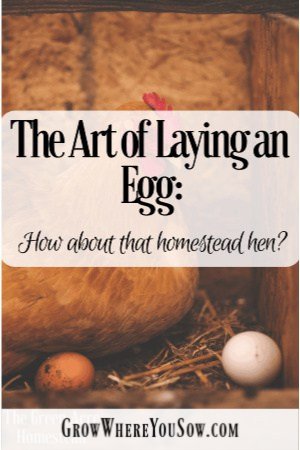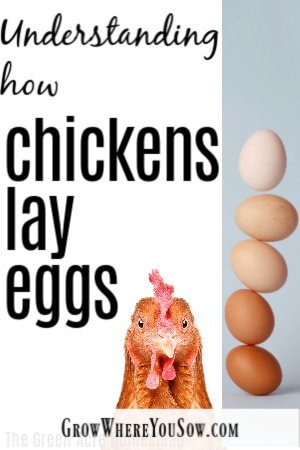The art of laying an egg
Many of my days on the homestead are chock full reading books and online literature, trying to fix a problem. This week I want to share a story with you about a down-home educational spark that was lit on the art of laying an egg.

Table of contents
How hens lay eggs and why it truly is an art. Understand more about your backyard chickens.
I hope, by the end of all this information, you’ll have a newfound appreciation for the eggs you eat. It really is fascinating to learn.
A little bit about the art of laying an egg
They’re great, but you probably already knew that. From a simple breakfast to creamy custards and delightful, homemade loaves of bread (the best kind!) we use them in a large majority of recipes. It’s funny that something used so often is such a mystery to many of us.
According to The American Egg Board “the U.S. produces about 75 billion eggs a year, about 10 percent of the world supply.”. Following that statistic, they state that 60% of the product produced is used by the consumer. That’s still 45 billion nuggets!
My Story
A few days ago I was outside giving my laying flock their nightly treat of scratch grains and collecting eggs. We have this fluffy brown, beautiful Rhode Island Red hen who has an attitude and personality out of this world!
Honestly, her attitude is an art all in itself. I threw the scratch down and the whole flock flew towards it except for her. I just got back in town nothing happened while I was gone. The day after I returned, our most senior chicken died and one of our Welsh Harlequin ducks injured her leg.
It’s like they all scheme against me and decide to wait for a disaster until I’m back in town! If it isn’t stick-tight fleas (a.k.a poultry fleas), it’s something else it seems.
Anyway, moving on….
Ms.Red had her feathers all puffed up, looking far more bulky than she usually does. Naturally, I asked what the deal was hoping that she’d answer me with “I’m fine” or “Something’s wrong you dodo”.
She didn’t do either of those things, but instead, she stared at me. I picked her up and flipped her over and saw an egg protruding from her vent. I didn’t touch it because my hands weren’t sterile and I had really no clue what to do anyway.
She didn’t seem to be in pain and I didn’t want her to miss out on the scratch, so I set her down. As I was starting to turn around thinking “Please don’t let her be egg-bound”, PLOP goes the butt-nugget. She looked back at me with such a satisfied “ha-ha” kind of look. She then trotted off to join her feathered friends for her share of the evening snack.
Well, folks, this got me a’thinkin’ and a’readin’ and here’s that’s what I want to share with you. This is how I got the idea for “The art of laying an egg”.
What is “egg-bound”?
I’ve known what it meant for a while because I had a duck that seemed to have the problem. I freaked out and did a fair amount of reading on being egg-bound and how to fix it. Here’s what I found in short:
- It means the hen has an egg stuck somewhere in her oviduct. Usually somewhere between the uterus and the cloaca, making it possible to see the egg in certain situations from the cloaca/vent. If you don’t know the anatomy of the avian reproductive system, check out this page!
- Being egg-bound is serious and can lead to death and infection in your hen. Unfortunately, it can also be a pain to deal with, no pun intended.
- Dealing with an egg-bound chicken or duck is no easy task. The task should never be tried without thorough reading on the subject. There are many steps you can take to prevent having an egg-bound hen such as providing them with the correct nutrition, enough space to lay, etc.
The Happy Chicken Coop has a really great and informative article on what it means to be egg-bound. Included are the steps to take to determine if your hen is egg-bound and how to fix it. You can read that article HERE. Luckily, I didn’t have an egg-bound chicken or duck and I sort of dread the day that I do.
How chickens lay an egg
Ah, the headliner! This is the information that really amazes me. Eggs are a staple food used in everyday life by at least 45 billion people. I was just one of the many who had no idea how the egg is made. So, what exactly goes into the laying of an egg? Well, here it is.
- Hens are born with the number of eggs they can produce in their life already stored inside their body. Once they’re spent, they’re spent.
- Slowly, one by one, the yolks mature and travel into the oviduct. On this journey, they’ll be encased in multiple layers of egg whites, wrapped in membranes to protect against disease, sealed with a shell, and finally, that shell is covered in a fast-drying layer of what most people call the “bloom”.
- A hens egg and feces comes out of the same hole, but not at the same time. So hens aren’t really “pooping” out the eggs your eating…that would be rather gross.
- Countryside Daily has an awesome article that goes into depth on egg laying and also touches on prolapsed vents. You can read that informative article by clicking HERE.
FUN FACT: Did you know you can leave your fresh, UNWASHED eggs on your counter for up to 30 days? This fluid coating (the bloom or cuticle) protects against bacteria and loss of moisture of the beautiful yolk and egg-whites your hen worked so hard to provide for you.
If you do wash your eggs, immediately refrigerate them to prevent spoilage. Also, if you purchase your eggs from the supermarket, they must remain refrigerator. All commercial eggs go through a wash/sanitizing process.
So what do you think about hens laying an egg?
I am amazed every time I read about chickens. Constantly, I’m learning more and more new-to-me information, proving that chickens are far more spectacular than most of us think. I mean, reading about chicken poo is even informative and interesting!
Kathy over at The Chicken Chick has my favorite article about chicken poop called “What’s the Scoop on Chicken Poop?“. It’s a great read with informative pictures. Just don’t plan for this article to be your afternoon lunch reading…you might not be pleased.


Hi Chelsea…I enjoyed reading your article about the art of laying an egg! I’ve had a couple of egg bound hens and was able to handle it…but it certainly isn’t a fun situation.
I would love to have you share your post on Farm Fresh Tuesdays! I started a brand new hop for homesteaders and would love to see you there. 🙂
I hope I never have an egg-bound hen…but I know that’s probably not realistic! I hop on over tomorrow and participate! Thank you for reading my article and thanks for the invite. I’m looking forward to participating and seeing all the great articles and bloggers!